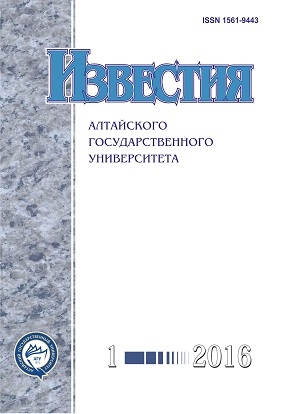Absolutely Closed Groups in Quasivarieties of Abelian Groups
Abstract
For an arbitrary quasivariety M of groups, a group G in M and a subgroup H of G we introduce a set domMG (H), which is referred to as the dominion of the subgroup H of the group G in the quasivariety M. Similarly for the set of all elements of G, each of them has equal images under any pair of homomorphisms from G into an arbitrary group M ∈ M which coincide on H. A group H ∈ M is said to be absolutely closed in M if domMG(H) = H for every group G ∈ Mcontaining H as a subgroup. In this paper, the absolutely closed groups in the quasivarieties of Abelian groups are studied. Let M be an arbitrary quasivariety of Abelian groups, ξ(M) be a set of prime numbers p, for which of them there exists a natural number k = k(p) that the following conditions are true: Zpk−1 ∈ M, and Zpk ∉ M, where Zpk−1 , Zpk are cyclic groups of orders p(k−1), pk respectively. It is proved that a group H ∈ M is absolutely closed in M if and only if the following is true: for any element y of infinite order, belonging to reduced subgroupHr of the group H, and for any number p ∈ M the statement ypk−1 ∈ Hpkr is true.
DOI 10.14258/izvasu(2016)1-34
Downloads
Metrics
References
Isbell J.R. Epimorphisms and Dominions // Proceedings of the Conference on Categorical Algebra. — New York 1966.
Budkin A. Dominions in Quasivarieties of Universal Algebras // Studia Logica. — 2004. — Т. 78, № 1–2.
Higgins P.M. Epimorphisms and Amalgams // Colloq. Math. — 1988. — Т. 56.
Шахова С.А. О решетках доминионов в квазимногообразиях абелевых групп // Алгебра и логика. — 2005. — Т. 44, № 2.
Шахова С.А. Условия дистрибутивности решеток доминионов в квазимногообразиях абелевых групп // Алгебра и логика. — 2006. —
Т. 45, № 4.
Шахова С.А. О существовании решеки доминионов в квазимногообразиях абелевых групп // Известия Алтайского гос. ун-та. —
— Т. 69, № 1.
Шахова С.А. Абсолютно замкнутые группы в классе 2-ступенно нильпотентных групп без кручения // Математические заметки. — 2015. — Т. 97, № 6.
Magidin A. Dominions in Varieties of Nilpotent Groups // Comm. Algebra. — 2000. — Т. 28, № 3.
Magidin А. Absolutely Closed Nil-2 Groups // Algebra Univers. — 1999. — Т. 42, № 1-2.
Будкин А.И. О замкнутости локально циклической подгруппы в метабелевой группе // Сиб. матем. журнал. — 2014. — Т. 55, № 6.
Будкин А.И. Об абсолютной замкнутости абелевых групп без кручения в классе метабелевых групп // Алгебра и логика. — 2014. — Т. 53, № 1.
Каргаполов М.И., Мерзляков Ю.И. Основы теории групп. — М., 1977.
Мальцев А.И. Алгебраические системы. — М., 1970.
Будкин А.И. Квазимногообразия групп. — Барнаул, 2002.
Горбунов В.А. Алгебраическая теория квазимногообразий групп. — Новосибирск, 1999.
Виноградов А.А. Квазимногообразия абелевых групп // Алгебра и логика. — 1965. — Т. 4, № 6.
Izvestiya of Altai State University is a golden publisher, as we allow self-archiving, but most importantly we are fully transparent about your rights.
Authors may present and discuss their findings ahead of publication: at biological or scientific conferences, on preprint servers, in public databases, and in blogs, wikis, tweets, and other informal communication channels.
Izvestiya of Altai State University allows authors to deposit manuscripts (currently under review or those for intended submission to Izvestiya of Altai State University) in non-commercial, pre-print servers such as ArXiv.
Authors who publish with this journal agree to the following terms:
- Authors retain copyright and grant the journal right of first publication with the work simultaneously licensed under a Creative Commons Attribution License (CC BY 4.0) that allows others to share the work with an acknowledgement of the work's authorship and initial publication in this journal.
- Authors are able to enter into separate, additional contractual arrangements for the non-exclusive distribution of the journal's published version of the work (e.g., post it to an institutional repository or publish it in a book), with an acknowledgement of its initial publication in this journal.
- Authors are permitted and encouraged to post their work online (e.g., in institutional repositories or on their website) prior to and during the submission process, as it can lead to productive exchanges, as well as earlier and greater citation of published work (See The Effect of Open Access).








